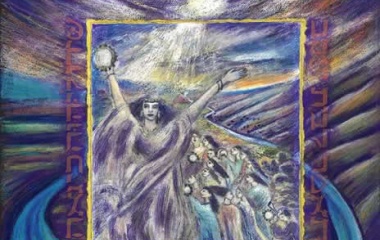
The transition point from the generation that left Egypt to the one that entered the Land of Israel is never mentioned in the Torah. The Torah does not tell us that the death of Miriam was in year 40, and there is nothing in the text that would necessarily prevent one from arguing it was in year one. For that matter, one could argue that Moshe hit the rock in year one. While it is clear that he is still leading the people 40 years later, that does not prove anything. He may have been punished but that punishment may have been delayed for 40 years[1].
To flip the argument, perhaps Korach led his rebellion in year 40. With the nation about to enter the Land what better time to foment a rebellion? All we know explicitly is that the sin of the spies took place soon after leaving Egypt[2] and that the census of the Jewish people recorded in Bamidbar chapter 26 did not include anyone from the first census that opens up the book of Bamidbar “for G-d had said of them, ‘They shall die in the wilderness’, Not one of them survived except Caleb son of Yefuneh and Joshua son of Nun” (Bamidbar 26:65), i.e. it took place in year 40.
Apparently, the Torah wanted to seamlessly link the two generations. On the one hand this is most upsetting as the Jewish people have learned little from the mistakes of their parents. The same complaints about food and water, the same desire to go back to Israel are not just the continued display of the slave mentality of the generation that left Egypt. It is the complaining of the generation that was about to conquer the Land, a generation that would need much guidance. They had learned little – not unlike the generations since the destruction of the Temple. Despite being told that we were exiled because of constant infighting we sadly continue to do the same. We truly are a stiff-necked people.
At the same time the Torah is highlighting the continuity of Jewish history. Each generation forms a crucial link in the unfolding story of the Jewish people. The glory of the Jewish people is the passing down of our tradition from one generation to the next. While the external trappings might change from generation to generation, the essence of our way of life remains constant. We say the same words of the Shemoneh Esrei the Anshei Knesset HaGedollah composed some 2,600 years ago. We shake the same lulav, blow the same shofar, eat the same food – or shall we say avoid the same foods, wherever and whenever we may live. It matters little what generation we are from.
I write these words from my hotel room in Budapest about to start our Journey through Jewish History in Central Europe, having just completed our journey to Spain. It is so inspiring to walk the streets where the Rambam, the Ramban, the Rosh, the Rashba, Rabeinu Yonah and so many others of our people walked. To see the beautiful places they lived even as we are saddened by the persecutions. To realize wherever we may live – and we journeyed with people from many places – we are literally following in their footsteps. It is their teachings we study and their rulings that we follow. We don’t ask what did the Rambam say but rather what does the Rambam say. The past, present and future merge together as one.
Parshat Chukat is in fact the parsha that marks the transition from one generation to the next. There is nothing new under the sun. Issues and challenges do not go away with the passage of time. But each generation has the ability to build upon the past and to pave the way for a better future.
The above thoughts are very personal for me. This week I commemorated the 15th yahrzeit of my father z”l and last week the 25th yahrzeit of my mother z”l. Together that is 40 years, the time it took to raise a new generation. 40 is the biblical number of transition; the days of the flood, Moshe on Mount Sinai, Moshe praying for forgiveness, even the 40 days it takes, our Sages teach, to form a fetus.
My parents have left us, their children and the community they served with such distinction and devotion, a tremendous legacy in which to follow. They were my inspiration for the work I do. I pray that I can fill a little bit of the giant footsteps they left for us. Yehi zichram baruch.
[1] The Torah itself tells us that one of G-d’s traits is to delay punishment even for three of four generations.
[2] The Torah does not tell us the exact date that they were sent. The tradition that they returned on Tisha B’av is a rabbinic one and could be interpreted as a historical anachronism to link our exile from the Land to the initial rejection of the Land. In any event at this point in time Tisha B’Av had no meaning.



